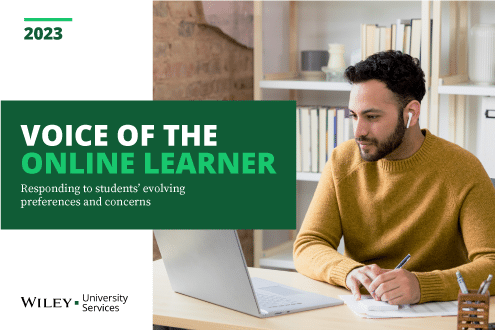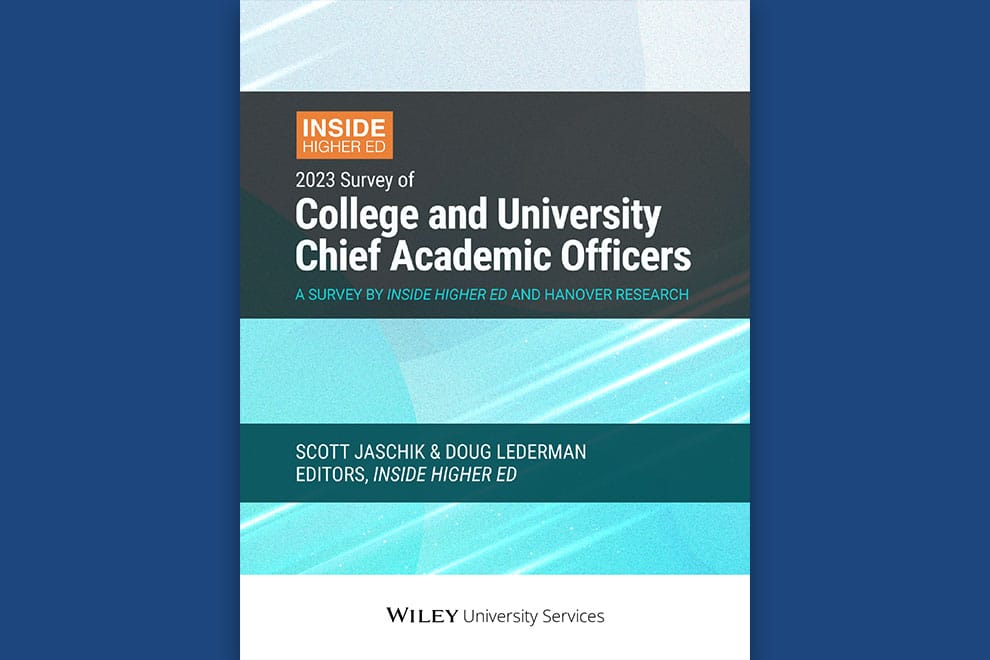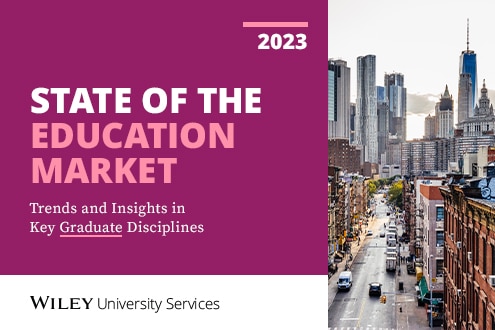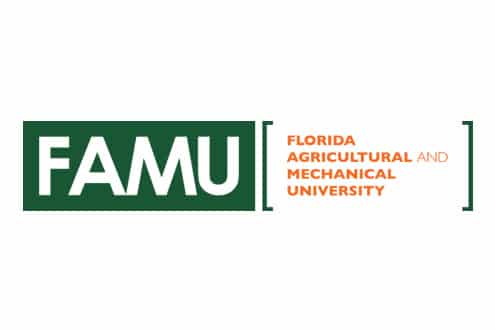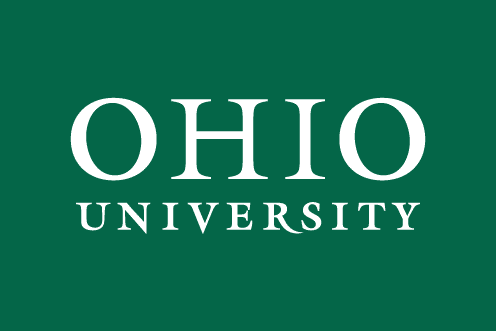Speaker 1:
You’re listening to An Educated Guest, a podcast that brings together great minds in higher ed to delve deeper into the innovations and trends guiding the future of education and careers. Hosted by the president of Wiley University Services. Todd Zipper.
Todd Zipper:
Hello, this is Todd Zipper, the host of An Educated Guest. On today’s show I speak with Ben Nelson, the founder of Minerva. Before Minerva Ben spent over 10 years at Snapfish, where he helped build the company from startup to the world’s largest personal publishing service. Founded in 2011, Minerva is a pathbreaking educational innovator preparing exceptional lifelong learners to address the most complex challenges of our time. Minerva mission to nurture critical wisdom for the sake of the world is being pursued through its flagship university programs and select strategic partnerships. We discussed on the show first, why Minerva University is reformer, not a disruptor believing that there can be a multiple outcomes in education, and that learners should be able to choose different end points.
Todd Zipper:
Second, leveraging social and experiential learning to provide the best outcomes for students. Third, how curriculum and courses can build off each other so students are deeply engaged throughout their student journey. Forth, the importance of teaching practical, useful knowledge so that when students graduate, they have many options for career paths and continue to grow. Fifth, what the future holds in regards to adaptive learning, social learning, experiential learning, and artificial intelligence. And finally, why higher education needs to focus more on education and engagement and not on certification. Hello, Ben, thank you for being here today on An Educated Guest.
Ben Nelson:
Thanks for having me Todd. Great to be here.
Todd Zipper:
So, before we jump into Minerva, let’s discuss your time right before you started Minerva and you left college, left Philadelphia, went out west and started one of the original success stories on the internet with Snapfish. I’d love to hear about that experience and how that informed you around taking this latest adventure.
Ben Nelson:
Sure. Snapfish was actually the second startup I was involved with and eventually ran, even though I didn’t start it, it was started by four other individuals and I joined relatively early, and rose through the ranks pretty quickly in the first few years. And eventually took over as CEO five years in. I came out west actually because I was running another company that I also didn’t start that I was hired to run when I was far too young to be running anything, but it was crazy days. And these were really interesting lessons. I mean, this is a dawn of the commercial internet and I’d been kind of working in and around it since the mid 90s. And I saw a few, there were a few kind of core lessons. I mean, one of which was that you could take an idea and create new standards in a sector practically overnight.
Ben Nelson:
I mean, it wasn’t overnight. There was a lot of hard work and blood, sweat and tears involved. But in the scheme of things, right when we were in the photo business at Snapfish to get to a global business with operations in 22 different countries and being five times the size of our next closest competitor and in a matter of less than a decade. That’s an astonishing level of rapidity. And so there was an element of that exposure, but there was also something even more profound, I think, which was, I got to understand the difference between what is traditional enterprise software and what’s consumer software. And Snapfish was fundamentally consumer business. We had a snapfish.com website where you can upload photos and get prints and eventually photo books and calendars and things like that. But there were all of these incumbent players, the old photo retailers, your Walmarts, Walgreens, Costcos.
Ben Nelson:
Actually that was where the market was. But their customers weren’t actually using their services online. And it wasn’t until those retailers came to Snapfish and said, we’ve tried to get our customers to go online. We tried to build our own websites. We tried to use enterprise software providers that all they do is build photo websites for retailers, but our consumers weren’t enjoying them. Can we just have what you’re doing? And when we built those sites for them, they wound up being the bulk of our business. And overnight we would take down one of their old sites and turn on one of our sites. And the next day volume would go up 10X without sending a single email, no message. Just because the site was designed with the consumer in mind. And it was a bit of an aha moment, which was, if you actually are talking to the end user, you can then provide a service to those people who already are with the customer. And really help them up-level their game. And it was actually one of the key inspirations for Minerva in our business model.
Todd Zipper:
Excellent. So, I’m going to start with a quote I read of yours and then jump into a question. “Nothing is more important for the world than nurturing critical wisdom. I found in Minerva to be the only institution in the world to systematically do that.” So, pretty powerful right there, and a lot to unpack. So, why don’t you walk me through the first decade of the Minerva project, which I believe is the original name. Now you also have the not-for-profit university Minerva University and then the tech for-profit called the Minerva Project. You started a decade ago, I remember those founding days reading the business plan and you’re here today. And then you have still a big, bold vision for the future. So, let’s start from the beginning.
Ben Nelson:
Sure. Well, as you quoted me saying, I do believe that when all is said and done the difference between humanity thriving versus surviving versus destroying itself is all ingredients of wisdom. We’re awash with information, we’re a wash with knowledge, we’re a wash with so-called expertise. And we are at a loss when experts disagree. We’re at a loss when people present different fact bases. But the reality is that all of those things are almost completely meaningless unless you apply systematic thinking and wise decision-making to that. And that is not a controversial perspective, frankly. I mean, I don’t know of a single university website that says, oh, come to our vaunted institution so that we can fill your head full of facts. That’s not in the marketing language of anybody. It’s all about, oh, we’ll think how to think, teach you how to think critically or solve problems creatively, or be globally aware, or be able to communicate effectively, or lead.
Ben Nelson:
But the reality is that the education infrastructure that we have in high school and higher education, and beyond doesn’t do any of those things. And it’s empirically proven not to do any of those things that when you learn, even when you learn a particular tool within an academic discipline, your ability to apply that same cognitive tool in another discipline, even within the same discipline, but in a different context within that discipline is de minimis. And that is the fundamental problem of transference or far transfer psychologists refer to it. And so what we decided to do at Minerva was to say, look if the world is becoming increasingly more complex, increasingly “faster”. If decisions have to be made with infinite amounts of data, but have to be done in a significantly shorter period of time, without providing systematic thinking in an effective way, we are lost, we are doomed.
Ben Nelson:
And so our mission was to nurture critical wisdom. It was to ensure that there are an increasingly large number of citizens all over the world that can not for their own sake, but for the sake of the world, for the sake of humanity, be able to think systematically and solve those problems with wisdom. And so early on our assumption much like in my Snapfish days was to say, well, there is no way for us to go to existing institutions and say, hey, you should really fundamentally reform the way that you teach. You should re anchor away from subject matter dissemination of information to systematic cross contextual systems. And we form your entire institution around that. Because of going to any institution and having that conversation would get us laughed out of the room. Much like if I was to try to go to Costco or Walgreens or Walmart in 2000 and say, you know how you’re doing photo, you’re the dominant photo providers in the world.
Ben Nelson:
You’re doing it all wrong. Let me tell you how to actually do it. Wouldn’t make any sense. You have to actually go and demonstrate it. And that’s why Minerva University was so crucial for us because we had to actually demonstrate with the same constraints, the same accreditation constraints, same 120 credit hours, all of our professors be having PhDs, making sure that we’re complying with every local federal statewide regulation. And where we could be measured against similar benchmarks, that the outcomes for the students, they would get into graduate schools, which are top notch. They would get unbelievable jobs. You could do all of those things while fundamentally reforming the substance of the institution. And so for us, the first decade of our existence was really about building the Minerva University prototype, the model. Demonstrating without a shadow of a doubt that we have created the greatest university in the world from scratch.
Ben Nelson:
And then using that same model to enable other like-minded institutions, rather than sitting around in committees and conference rooms saying, oh my God, we are our every decade re-imagining of general education has to be re-imagined once again, because last decade we re-imagined it. And it looked exactly like it did the previous decade. And none of those times actually taught our students effectively. We graduate students, and we can look at them and we don’t actually know that they are representative of the kind of education we want them to have.
Ben Nelson:
They are individuals within universities, leaders within these institutions that understand the problem. They understand that the fundamental offerings, especially in their undergraduate programs that are supposed to teach systematic thinking, don’t do that. And they need a model to latch on to. They need a partner to be able to actually channel that frustration and be able to get them to reform. And that’s been what we’ve started to engage on over the past couple of years and really in earnest over the past year or so, as we’ve demonstrated what we’ve done in Minerva University now are bringing that same model to other institutions.
Todd Zipper:
So, can we just talk about some of the nuts and bolts of Minerva? So, you’re disrupting, I love, by the way that side note, the article in Inside Higher Ed, by Doug Letterman, you’re the charter member of the higher ed disruptive crowd, which I would vote for that too. But you’re doing it sort of from the inside out. You’re not saying, oh, forget these degrees, forget this college experience. So, can you walk us through, you even mentioned, you still got 120 credit hours. You’re still getting a bachelor’s degree. But you’re not going on Saturdays to the big football game. You might not be going through this very expensive campus. Can you walk us through some of the compare and contrast of the model where it’s similar and where it’s different?
Ben Nelson:
Yeah. So much of the holy war or holy wars I should say because there are multiple of them in the education world are over artifice. I remember I was talking to some education entrepreneur who luckily is no longer in the space and said, oh, why are you doing what you’re doing? I was like, oh, I think education should take less time. Well, why? Oh, because it’s too much time. Why? To what end? To what purpose? And so much of what you hear, oh, we got to end a degree. We’ve got to go into micro-credentials. Why? Isn’t a transcript a set of micro-credentials that no one on the planet cares about? We’ve had micro-credentials ever since we’ve had transcripts. Here’s the 33 courses that you’ve taken grades in each one of them. Who looks at that information?
Ben Nelson:
Nobody. Yet people are obsessed with these meaningless containers as if that is the root cause of the problems that we have to solve. It has nothing to do with that. And so Minerva on the surface, except all the containers and in many ways, we’re not disruptors though I appreciate Doug’s anointing me into that, that hall of fame. We’re reformers. The big difference between a disruptor and a reformer is a disruptor comes around and says, burn everything to the ground. All the incumbents, they should all be extinct. There’s no value. There’s no merit with the barbarians at the gate, and we’re going to storm the castle and leave nothing behind. We’re going to be disruptive. And we’re going to take that for ourselves. That’s a disruptor. And much of business, creative destruction, that’s a good model. You have an incumbent ship maker, your goal isn’t to fix their business model.
Ben Nelson:
Your goal is then to ream them into bankruptcy. And so people who embrace the disruptor title in higher education need to say with a straight face, my goal is to end universities. That is not Minerva’s goal. We are reformers. We believe that there should be a hetero culture in education, that different institutions should stand for different perspectives, that students actually should be able to choose different pathways to different end points. And that you have to have a battle of ideas. But what we don’t believe in is this idea that those institutions should be advertising things that they do not do that they should be lying. We don’t believe that institutions should be employing methodologies that are empirically proven not to work. It’s not that there was a debate. Oh, maybe a lecture. Oh, he’s a good lecturer. Students were saying.
Ben Nelson:
No, there is no such thing. Passive learning simply does not work. It is in controvertible. The American Academy of Science, The National Academy of Science has decided that using a lecture as a control for research in the science of learning is like malpractice. It is worse than a sugar pill. It actually has worse outcomes than sugar pills do for curing disease. And so that is the kind of thing we are determined to reform. And so the perspective that we have is there’s no reason to fight the 120 credit hours. Is that optimal? Should it be 112? Should it be 140? Should credit hours be thrown out the window? We don’t care. That’s not what animates us. Should there be majors and minors or should everything, should there be no such thing? We don’t care. Should you be delivering your units of instruction in 15 week long courses, versus in seven week long, versus in modules. We don’t care.
Ben Nelson:
And so rather than fighting those battles, which are superficial and irrelevant, what we care about is substance. When you are in a learning environment, how do you think about what the student learns on their own? How you leverage social learning, where you learn with peers? And how you leverage experiential learning? How do you best deliver self study, social learning, and experiential learning? How do you actually customize the learning journey for the individual that it is effective while acknowledging the universality of learning style because there are not learning styles? If you’re deeply engaging with the material, you will learn. There is no such thing as different learning styles. Of course there are people with severe learning disabilities. There are people who have photographic memories. But we’re not talking about those extremes. And so substantively what Minerva has done is reimagined everything about the university while not disrupting the containers, such that no existing university can look at what we’re doing and say, that’s impossible for us to do.
Ben Nelson:
You can plug and play our curriculum. If you wanted to do a wholesale copy of Minerva, Stanford could do it tomorrow. Stanford could abandon everything they do curricularly, implement Minerva tomorrow without any disruption. Because at the surface, it all fits. Now fundamentally it means retraining the entire faculty, making sure that they understand how to do active learning, that they don’t just go up and lecture. That they engage the students. It means much greater expectations on the student’s part, because the students have to actually study. They have to show up to class prepared every single week. They can’t go in and say, oh, I’m just going to cram for the midterm and the final. They actually have to build off of what they’ve learned in previous classes and other classes that the curriculum is interconnected.
Ben Nelson:
So, if you don’t learn in a particular class, you’re going to have a very difficult time in other classes, even when there are different fields. And so the nature of what we do is that we are looking at learning as a pervasive organic system, as opposed to one that is delivered in disconnected bits and pieces. That’s fundamentally the difference. The way we’ve implemented at Minerva University the fact that our students are in residence in seven different countries, where they apply what they’ve learned experientially in different cultures. That’s a, I think a wonderful instantiation of that.
Ben Nelson:
But that’s not core to the Minerva model. What’s core to the Minerva model is a curriculum that is interconnected and cross contextual, but you learn something in one class and apply it across others, where the students are deeply engaged in fully active learning. They’re doing deep processing and learning at all times. Where they get systematic formative feedback throughout their entire journey. Where summative assessments are a combination of formative assessments over time. And where all of that is pervaded through a data system that enables a student journey to start from their very first day until their very last, and it’s all interconnected. You do those things, you’re offering them Minerva education.
Todd Zipper:
I read on your website something that was pretty powerful and I think what you just said, but maybe you could highlight a little bit more. Our approach in parts is set of cognitive skills, habits of mind and foundational concepts that effectively reprograms the learner’s minds. That last part was a pretty futuristic here. So, can you unpack that a little bit?
Ben Nelson:
Sure. If you think about what is wisdom, what’s a wise person? There’s all sorts of colloquial misunderstanding of what wisdom is. But the fundamental element of it is you are in a situation you’ve not encountered before. If you’re in a situation you’ve encountered before, that’s just memory knowing. And not what do I do next? But you’re in a situation you’ve never encountered before. And you’re presented with a problem for which you can find analogs in your past and apply those analogs to effectively solve that problem or to move to the next step. That is wisdom. What do you do? You go to a wise person to know what do I do in this situation? Not because that person was in that situation because that person fundamentally understands what to do. Now, if you had gone to that same person 30 years before, you wouldn’t want to actually get their advice. They wouldn’t be considered wise at that time.
Ben Nelson:
Because the way we normally attain wisdom is through decades of making those mistakes on our own in context, after context, until we see a pattern emerge at which point our brain is rewired. Once we have gotten the Pavlovian reaction again and again, we’ve been burned at work in interpersonal relationships, in our political affiliation. And we see, oh, every one of those times what people said, wasn’t what they actually meant. I need to understand their motivation in order to actually assess whether or not I want to jump on board. That’s now a nugget of wisdom. That’s a cognitive tool. And it’s a way that the mind evolves over time. So, why would we as educators wait for that to happen only to a very small sliver of humanity and only by accident as they stumble through life. When we know so many of the tools that allow our fellow citizens to be more effective, being able to understand the difference between a fact and a claim and all of the components that are necessary to do that.
Ben Nelson:
Being able to make decision trade-offs and think through all of the elements that are associated with them. Being able to modify what you say so that the audience that is listening to you can actually understand what you’re saying. Being able to think about unintended consequences of your actions and second and third order of facts, immersion properties. These are not perspectives, not opinions. These are the tools that govern the world that we live in and being able to navigate them and deploy them makes you a wise person. Now it doesn’t make you fully enlightened. It doesn’t mean that you can solve any problem that you’re presented with at any point.
Ben Nelson:
But it gives you an enormous leg up in that process. And so given that we know this, given we know, and we can enumerate all of these cognitive tools, these habits of mind, foundational concepts that are generative, that we can build on top of. Given that we know how to teach it. You present them in cross contextual ways. You make sure the students are deeply engaged in learning them. You provide them constant feedback on how you apply them from context after context. You design an educational journey that is data-driven and holistic. That isn’t just randomly drawn up by individual components of that. Why wouldn’t you do such a thing?
Todd Zipper:
It makes a ton of sense for me. How do you think about that pathway from the end of their program into a career? So, they built these foundational concepts. How does Minerva approach that?
Ben Nelson:
So, this is in some ways, the core reason for why American higher education system was built initially. If you think about the current higher education system, where it is and the battles that have primarily raged around it over the past several decades, but even going back a century plus there are these two camps that seem to be diametrically opposed. There is the vocational camp. You go to higher education to learn a skill, or a craft, or a career. And you are honing that as deeply as you can. And then there is the landed Gentry crowd, which is junior needs to know what to do with their trust fund at cocktail parties. And therefore you have to make sure that they learn for the sake of learning. And that learning fundamentally has to be useless. And they both claim various parts of Americana as the reason for why they exist.
Ben Nelson:
But the reality is the founding fathers of this country were crystal clear that neither of those models were the ones that they supported. If you look back at the first founding father that actually talked about this, it was Benjamin Franklin in the 1730s. And our supposed Alma mater that was supposedly founded by him, even though it wasn’t. Alma mater bought his school and then shut it down immediately. And then of course only in retrospect that, oh, no, no, no, he founded us. He did not find by the University of Pennsylvania. But in his philosophy you had to teach practical knowledge, not vocational, not a career and not just the ornamental, not just the learning for learning’s sake. Thomas Jefferson called it useful knowledge. In fact, he went so far when he founded the University of Virginia decades later to ban the University of Virginia from teaching divinity. Because he found it to be not useful.
Ben Nelson:
And to this day, the University of Virginia does not have a divinity school. Because this was Thomas Jefferson’s one of his core wishes. And fundamental to that philosophy was this perspective that when you graduate, when you become a franchise citizen in a free society, where you are yourself sovereign, you must participate in governance. And it doesn’t matter if your vocation is in governance or not, but you have to go to the polls. You have to be able to vote. You have to be able to support a law, or not. You may even be called upon to serve, to be a legislature, a legislator, I should say, a judge, a diplomat. As of course, Franklin and Jefferson were. And in order to do that, you had to have been trained in the disciplines of liberal arts that allowed you to have freedom or sovereignty or Liberty, the liberal arts.
Ben Nelson:
And so all of our yapping about, oh no, no, no. The liberal arts is really about sitting under a tree and reading a poem and [inaudible 00:27:17]. That is a bastardization of the term. The liberal arts enable a free society to exist. It enables you not to be a subject of a king or a cross. It enables you to actually change what it is that you do and not focus on one stream, one career, which we all know is a historical accident.
Ben Nelson:
That the modern world doesn’t tolerate or is not very tolerant of individuals who know one thing, because as students graduating now we’ll have 60, 70, 80 year long careers. The likelihood that those careers will stay in a vocation is very, very, very low. Not to mention, forget the people who graduated 20, 30 years ago. Think about almost any of our listeners. I would bet are not doing the job today that they did when they graduated college. And so that’s how we think about it. We think about practical knowledge as the most important thing to teach and yeah learning a particular trade vocation field, that’s the easy part. That comes on top.
Todd Zipper:
So, I’ve heard Minerva described as an alternative to the Ivy or Ivy League alternative, which often means selective, not that many students, we probably can count less than, I don’t know, 10 or 15,000 freshmen a year go into these schools. So, that’s the bucket that you’re in right now, at least from a student count perspective, maybe the inputs of the students coming in are probably super qualified and talented. How do you think about this not being this incredible model, but it’s a tree falling in the forest that no one hears. How do you disseminate this to the Stanfords that have their own unique snowflake that they can never touch?
Ben Nelson:
Right. Well, this is actually the grand strategy. When I was starting Minerva 11 years ago, I realized that I and my family, we die at 91 and we die on the job. And so at the time I did the calculation, I had 56 years to make this whole thing work. And I said, okay. So, if I’ve got a 56 year plan, how do I actually enable global reformation of secondary and post-secondary education? Well, step one is to establish a leading position. And the reality is that higher education in particular, but secondary education as well, but higher education in particular is very hierarchical. The conversations that universities have all the time is what does the leader do and how can we follow? And the problem is that what the leaders currently do in higher education is spend an enormous amount of money period.
Ben Nelson:
Because the definition of leadership, the metrics is how much money can you raise and how few students as a proportion, can you spend that money against? If you want to hack the US News and World Reports formula, it’s very simple. Reject as many students as you can. So, you have a small student body. Hire as many professors as you can to service those students, whether they talk to them in class or not, that doesn’t matter, just have to be on the payroll and then spend as much money per professor as you possibly can. You do those things and you are number one in US News and World Report times higher education, QS world ranking, Shanghai, it’s the same formula. Spend money. And so when the leaders, when that is the model, the entire sector is going off a cliff. And so our perspective was different.
Ben Nelson:
And the reason that we could get away with it is because for the past 30, 40 years, universities at the top have convinced 7 billion people on the planet of a lie. And the lie is that that spending of money, the prestige they get really by publishing research, which is what most of that money goes towards is somehow correlated with educational outcomes, especially for undergraduates. Whereas the empirical evidence once again, is that it is the opposite. The better the professor is at research, the worst educational outcomes are there of their undergraduates. There is a negative correlation. But that lies extraordinarily useful because what that enabled Minerva to do is to say, okay, game. We are going to start the world’s greatest university, and we’re going to use the metrics that you publicly talk about. We’re going to demonstrate that we’re going to be selective and all of the other trappings. But that our educational outcomes will shatter the kind of educational outcomes that a Harvard or Stanford or any other Ivy League University can present.
Ben Nelson:
And by the way, we will do that, not just in depth of mastery, but we’ll do it in breadth of application, which nobody else can demonstrate. We will do that in outcomes of our students. And we will do it with a group of students from a socioeconomic background that is vastly more diverse than highly selective universities that frankly get many of their outcomes from the fact that Thurston Howell third gets their job from Thurston Howell the second and their fate is guaranteed before they even start at these institutions. And that’s what we’ve proceeded to do. And so our entire theory of change was now we’ve created a model that other universities want to follow, that they don’t begrudgingly have to follow. And now the Minerva project, the corporation is enabling them to do that. And in fact, all of the science that Minerva is based on has been demonstrated to have greater impact with students that have traditionally struggled in academia than those who already do well.
Ben Nelson:
And so the fact that we’ve been able to demonstrate dramatic improvements in students that are already the very best has then suggested, and now we’ve proven it with several of our partners that the impact that we see with students that have traditionally struggled in academic settings is even bigger. So, as an example, we had a partner in rural India where we did a one-year pilot with. And the students in that pilot, where we had half of the time, actually 40% of their time, not a hundred percent of that we do with our own students, where some of them we have to teach remedial English to, their learning gains were significantly larger than the learning gains of our own students. And whereas with our students, we actually employ the F as a tool, but it was most times like if universities do not. We actually reduced the failure rates of those students by more than half in our classes compared to their non Minerva classes.
Ben Nelson:
And the failure rates of those students in the non Minerva were a third lower than the failure of the non Minerva classes the previous year for the students that didn’t have a Minerva education. And so the impact of taking our model, the thousands of students who have now experienced outside of our walls is crucial. And we will fail, I will certainly consider ourselves a failure, if that group of institutions is again, maybe not one tree, but half a dozen trees that are in the woods that nobody knows about. And that the only way we succeed is if our reformation is one that takes hold much, much more broadly. Whether institutions work with us or not, is actually not relevant. What’s relevant is that they abandon the practices that are anti educational for their own student body and have a different leader to look up to. And that’s really the whole Minerva plan.
Todd Zipper:
You mentioned using learning science and technology. I’m sure just in the last decade a lot has changed. How do you think about that? How do you think about AI? Self-directed learning? Because when in 56 years, or now 46 years from now, I’m assuming this stuff will advanced a lot. I mean, how are you thinking about this?
Ben Nelson:
Absolutely. So, I think there are some things that are, to me, writing on the wall. There are other things that I’m perplexed as to why they’ve taken this long. And there are other things which I actually maybe are beyond my imaginative capacity to see. So, and there are some things that I guess are somewhat in between. So, I think there’s a category of things I don’t understand why they’ve not occurred. So, when I was starting Minerva 11 years ago, my assumption is that certainly by now adaptive learning would have completely dominated and taken off for information transmission. That no one in their right mind would be sitting in a psych 101 lecture and econ 101 lecture. That it was all be diced up, put online, you answer a bunch of questions. And depending on what you answered, you would move on to the next. At the very least, I thought that no one would be teaching a math class anymore.
Ben Nelson:
That Sal Khan and others would definitively proven, it’s a better model to learn basic equations and who would do the damage. And somehow that’s still has a way to go to be the standard. So, I’m no less of a believer in the fact that self study and information acquisition is best done in a non-social area. In fact, that’s, again, not particularly controversial is called homework. I don’t think most teachers like the idea of students showing up unprepared. And so the idea of working on making that preparatory work better, I think, is an enormous opportunity. And maybe I’m still a optimist, even though it’s clearly taking longer than it should. But somebody or bodies, most likely will figure out how to make preparatory self-learning vastly, vastly, vastly better. That the homework experience will be better for the learner. That brings us then to social learning. The kind of learning that has to be a conversation, where it is not a black or white, it’s a black or gray.
Ben Nelson:
Is it certainly wrong or is it potentially true? And you actually have to think about it. You have to look at it in different perspectives. You may not get to a conclusive answer. And can AI, or will AI get there? I would imagine at some point, but it’s far, far, far away. I mean, we’ve got a long, long time before AI can get you down into deep nuance and understanding, oh, that’s an interesting one that context with those conditions, I guess that could work. But how likely is that? How realistic? Let’s think about that. What if Black Swan events occur? This is challenging for humans let alone to program even to conceive of how to structure that. And so for me, social learning, especially as you relegate so much of information dissemination to asynchronous learning, social learning is highly benefited by data. But needs to be done in an environment where we referred to as the digital learning environment that takes that data and makes the professor and the learners in that environment supercharged.
Ben Nelson:
Gives them superpowers, enables them to do things that they wouldn’t be able to do in a non data mediated environment. What’s commonly known as the classroom or Zoom or any other, or frankly, of these online platforms that are really just replications of ineffective, offline classrooms. And then there are these experiential worlds where you take and apply what you have learned in real-world types of experiences. And they’re people are kind of big on virtual reality and oh, you get to drive through the pyramids. I frankly don’t get it. I don’t really see why it is that the expense of designing a three-dimensional King Tut’s Tomb, is that worth it for whatever learning objective you actually have, not for entertainment, not for like shoot ’em ups and for the mummy to jump out and try to strangle you. But for an actual learning deeply engaged processing than any other medium that is not nearly as distracting.
Ben Nelson:
Having said that, the potential for augmented reality, when it gets here, it’s not here yet, but for you to actually be able to be in a physical location, doing experiential education, but actually seeing data, understanding context, having background, I mean, effectively, that’s where iPhone is. You’re in a meeting, somebody says something, oh, I’ve never heard about that. Bam. You look it up on Google. And you’re like, oh, I have a little bit more of a base of information. I can react to it. It can be a little bit more intelligent in my response. I think that is going to continue to elevate experiential learning. And we need to incorporate that, but I don’t think it’s going to come from education. It’s going to come from the Googles of the world. It’s going to come from the Apples of the world. They’re going to make the world more augmented and we need to be able to take advantage of that.
Todd Zipper:
Yeah. You just spawned a question in my mind, in terms of big technology, they really are tackling so many different industries. Do you see them coming into the education space, whether it’s K-12 or higher ed and bringing something that helps advance the system more? Or is it more about selling more iPads and other things like that?
Ben Nelson:
Yeah, I think it’s more the latter. Look, I mean, Apple, Google they’ve been in education forever. I mean, Apple has been in education since the 80s. It’s been a core element of their strategy. But again, you have to think about the DNA. What is it that they’re trying to do? Where are they making their money? Why are they doing what they’re doing? And ultimately, if I’m Zoom, am I feeling comfortable? Probably not. Especially given that in COVID the only way you go from a 100% market share is down, especially when Zoom is being used for a lot of things that they’re not going to be used for when we can safely go out of the house. So, yeah, if I’m Zoom and I’m worried about big tech, I would be worried about big tech. But Zoom is big tech.
Ben Nelson:
It’s a general purpose utility that has been used in ineffective ways for a particular purpose. And that is what Apple and Google and Amazon are great at. General purpose utilities. Now, every once in a while, they’ll decide to go deep. Like Amazon and Apple decide, you know what? We’re going to go deep in entertainment. Yet at the same time, jury’s still out, but Netflix is still better than Amazon Prime or Apple Plus, and so is Disney. Yeah, it’s going to be a little bit hard and maybe one day Apple will buy Disney. Maybe one day Amazon will buy Netflix, who knows. But it’s not core to their DNA. Same thing about education.
Ben Nelson:
What are Apple or Google really going to do to buy substantive value in the education space as opposed to improving their utility? And look, I mean, we built our technology on web RTC, which was a standard, a video standard launched by Google in January 2013. And without web RTC, Minerva couldn’t exist. And so we host on Amazon web services. And so without Amazon or the Cloud, we couldn’t exist. And so big tech is playing a crucial role, but they play that role where they’re comfortable.
Todd Zipper:
So, let me switch gears and ask you a couple of questions about the market at large. Over the last decade, we’ve seen a new wave of universities develop all of this driven by online Southern New Hampshire University, with I think over 170,000 students. We’ve got Arizona State University, which is well over 70,000. Western Governors, which is well over a hundred thousand. On the flip side of that, you also have these mega platforms. Those are not for profits. Then on the flip side, you have these platforms or marketplaces in Coursera. We’ve got edX, which is now part of [TU 00:44:16]. We even have Chegg, which has got six plus million subscribers. These are big direct to consumer platforms that are global in nature. How do you see this sort of market evolving?
Ben Nelson:
Yeah. Well, before you had Southern New Hampshire and Western Governors, you had the University of Phoenix and you had Laureate. There’s a reason why in our sector, there’s this term called a diploma mill. And it suggests that you are potentially handing out a credential to anybody who wants it. And the reality is that I would argue that Harvard and Brown are as guilty of being diploma mills as Southern New Hampshire is, maybe even more so. When you go and you get into an Ivy League University, you can’t not get your diploma unless you opt to physically leave. And even when you do the university will do whatever it can to prevent you from leaving. You effectively have your diploma the minute you enroll, it’s just kept in a security box for four years. But that doesn’t really make the instantiation of the diploma mills, which says, hey, anybody can get in and anybody can graduate much of a better thing.
Ben Nelson:
Again, if you think about the core purpose of education, it is to educate. It isn’t to certify. And my broad analysis of the education sector is that it does not exist. We have a certification sector. And so long as the sector is obsessed with certification, standards will continue to deteriorate as they have over the past 50 years, and they’ve been plummeting over the past decade. And they will continue to hand out those certificates to all comers. And what we’re trying to do in our reformation is to shift the certification to education. And basically hand out those types of certifications only to those who engage. But you cannot have a learner engage unless you give them an engaging environment. And so all of a sudden there’s a shift in responsibility because to certify as easy, to engage and enable learning is hard. And our goal is not to diminish the number of people who are getting certified, but to make sure that that certification is done in such a way that actually certifies real sustainable learning.
Ben Nelson:
Not learning as is currently done, where you can take a student let alone from Arizona State or Western Governors, but certainly from Harvard or Brown, where much of this research is done, where they have passed the gate, they’ve gotten their age, they’ve gotten their competency in a particular class. And six months later, you administer the same final exam and they’ve forgotten 90% of what they tested on correctly. That is the epitome of a non-educational certification. And that is what entire sector is based on.
Todd Zipper:
So, how do we fix this? I know Minerva is doing their part, if you will. But are there other, you talk about reform, which is not a revolution per se. Although I think some reformations have been-
Ben Nelson:
Reformations can get [bloody 00:47:45].
Todd Zipper:
Yeah, they can get there. What other things have to happen? Parents are allowing this to happen with their children in K-12 because they don’t know any better. What can they do? What other things can we do as citizens to help reform?
Ben Nelson:
So, I think first and foremost, and most importantly is do not accept the status quo. You can even say, look, I went to such and such university, but just to be clear, I didn’t learn anything in class. I had a good time. It was fun. Met a lot of good friends. But that’s not okay. It’s not okay that I’d learned anything. When I started Minerva, I was going out and raising money and all the Ivy League graduates, all the Stanford graduates I talked to say, why do you keep talking about the curriculum? Don’t you know you don’t learn anything in college. We accept it. It’s not that we’re unaware. It’s not that we think back and say, oh my God, thank goodness I took sociology 235. I use that every day. We look back and broadly look at the classes that we took in college and think of them as almost uniformly useless. But we accept it.
Ben Nelson:
We can’t accept it. We have to loudly complain, say that it is unacceptable. And when there are alternatives that show up that provide the other things that we value a great community, a good residential experience, whatever it is. But then also provide a real education, we have to be supportive. So, that’s element number one. Element number two is when you have that pit in your stomach, when you’re sitting in a faculty meeting and the faculty says, yeah we’re going to reform gen ed. But we really only care about our department budgets. Well, but I still want to lecture. Oh, but you know this and so-and-so professor doesn’t want to do it. And oh, this is too much difficulty. The instinct is this battle is too hard, I’m going to retreat. I’m going to get a vote of no confidence.
Ben Nelson:
I’m going to run away. That is unacceptable. When your perspective is, I have to worry about my job. Then you shouldn’t be in education. If you’re in education. Again, if you believe in certification, if you’re a diploma mill and you like it, and you say, you know what, I want to make money. And I want to spit out diplomas and collect the cash and ring the tail or spit out certificates or micro-credentials or whatever it is. And I’m in it for the money. Be honest about it. But if you want to call yourself an educator, then what you’re doing is you are having the lives of humans, not of your students, but the lives of the people they will impact in your hands. And if heaven forbid, one of your uneducated, but highly certified individuals, attains a position of power, their blood is on your hands. And so when you have that perspective and your faculty member says, yeah, I don’t feel like it. You need to have fire and brimstone raining down on that individual until they are shamed at having that kind of position. That dynamic has to change.
Todd Zipper:
Yeah. It’s interesting. The example, which I don’t think it’s talked about enough is the president of Enron, Jeff Skilling. Who went to Harvard business school and obviously a great institution by whatever measure, we’d like to publicly talk about. But yet they graduated someone that went on to help perpetuate [crosstalk 00:51:31]-
Ben Nelson:
We don’t need to look that far back.
Todd Zipper:
Yeah.
Ben Nelson:
The two leaders of the insurrection traders to our government in January of the 6th, had degrees from Stanford, Harvard, Princeton, and Yale. Now, do you think that those institutions saw January the sixth with uniform horror among the faculty, among the administration, no supporters for that. And do you think they look back at that and said, oh my God, how did we certify those individuals? How have we failed at providing an education that could lead to a potential coup for the most important democracy in the world. That conversation was not had in any of those four institutions.
Todd Zipper:
Powerful. Well, on that note, thank you, Ben, for your time. I asked this last question of all my guests. Part of what we love about education is that we all have learning champions. So, who has been a learning champion for you and how has that person helped you in your life?
Ben Nelson:
Oh my, so I’ve had several. But really the person who has set me on this course is Dr. Ira Harkavy at the University of Pennsylvania. He co-taught a class with Lee Benson when I was a freshman, even though it was only there for upper-class students, he let me in as a freshman. And that was the class where I was exposed to the three philosophers, I would say, that that shaped my educational perspective, which were Franklin, Dewey and Hutchins at University of Chicago.
Ben Nelson:
And what Ira enabled me to understand was that education is only relevant as it matters for society, that anything else is artifice. And it helped me shift my perspective of education being what is fundamentally a selfish act? What do I get from education? How do I use it to get ahead or to the next step to actually, what is the responsibility of an educated person to fellow humans?
Todd Zipper:
That’s fantastic, Ben. So, thank you so much for being here today with me, it’s always a pleasure to talk about how you can perform higher education. I just love it. So, until next time, this has been An Educated Guest.
Speaker 1:
Thanks for joining us on today’s episode. If you like what you’re hearing, be sure to subscribe to An Educated Guest on your listing platform so you don’t miss the latest episodes. For more information on Wiley University Services, please visit universityservices.wiley.com.






